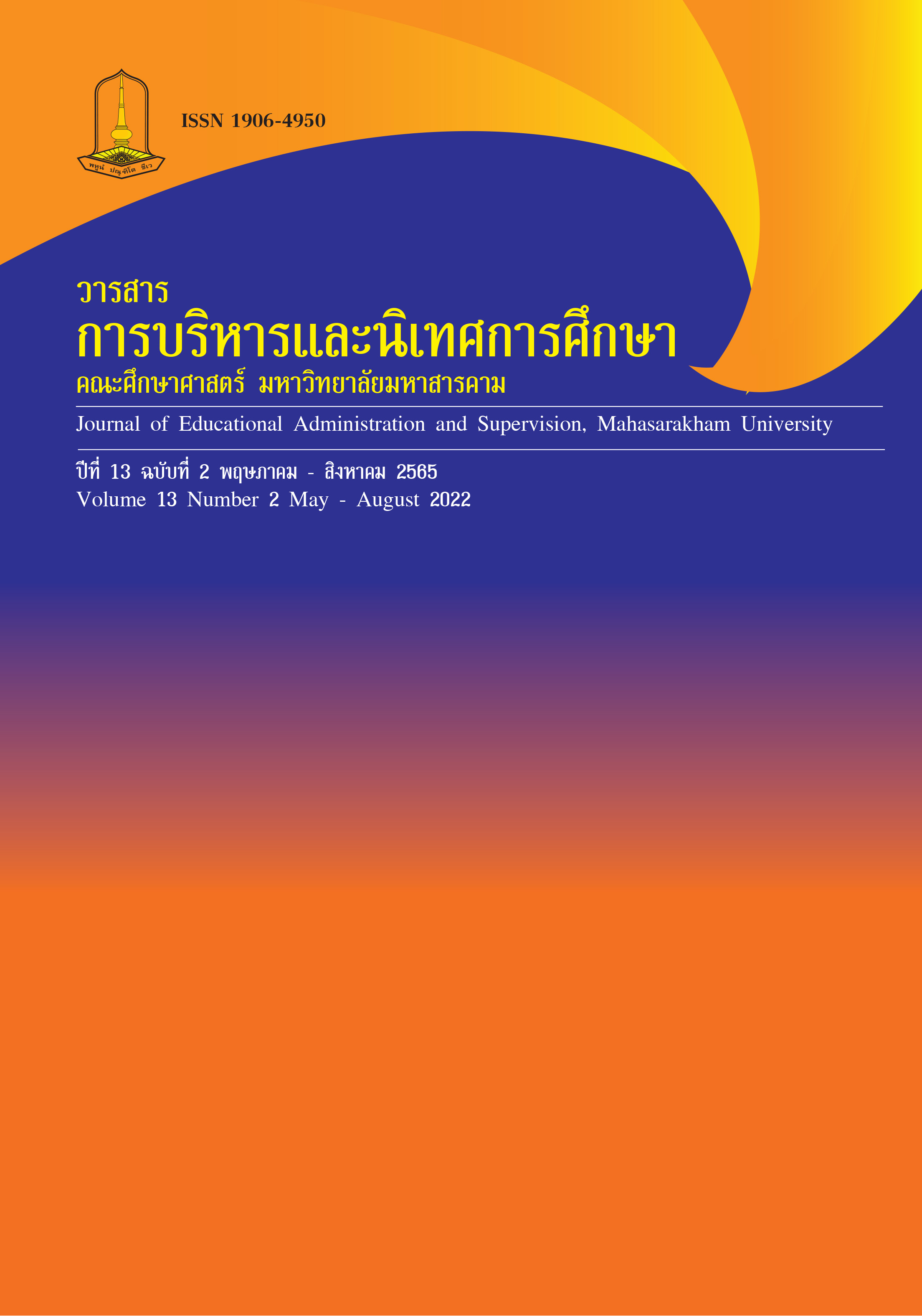Academic Leadership of School Administrators Affecting the Teaching Efficiency of Teachers in school under Roi et Primary Educational Service Area Office 1
Main Article Content
Abstract
This research aimed: 1) to study the academic leadership of school administrators under the Roi et primary educational service area office 1 2) to study the teaching efficiency of teachers in school under the Roi et primary educational service area office 1 3) to study
the relationship of the academic leadership of school administrators affecting the teaching efficiency of teachers and 4) to study the academic leadership of school administrators affecting the teaching efficiency of teachers under the Roi et primary educational service area office 1. The samples of this research were 342 the school administrators and the teachers under the Roi et primary educational service area office 1; 30 administrators and 312 teachers. The research instrument was a 5-level rating scale questionnaire with reliability of innovative leadership of school administrators is 0.82 and the efficiency of academic administration was 0.74 The statistics used for data analysis were mean, standard deviation, Pearson’s Product Moment Correlation Coefficient and Stepwise Multiple Regression.
The research results were as follows:
1) The academic leadership of school administrators under the Roi et primary education service area office 1 on overall was at the highest level. When considering each aspect, it was found that aspects were at the highest average level. There are professional
teacher’s development, defining vision, goal and the learning mission, curriculum and teaching management, and the supervision learning management. The lowest average level is making the environment to support to learn. 2) The teaching efficiency of teachers on overall was at the highest level. When considering each aspect, it was found that aspects were at the highest average level. There are making atmosphere and environment support to learn,measurement and evaluation learning, the various techniques and teaching skill, plan and prepare to teach. The lowest average is the knowledge and understanding to curriculum
and content of subject that teaching 3) The relationship academic leadership of school administrators affecting the teaching efficiency of teachers correlated positively with the statistically significant at .01 level. 4) The academic leadership of school administrators. Make the environment to support to learn (X5), professional teacher’s development (X4), curriculum and teaching management (X2) together predicted the teaching efficiency of teachers at 54.70 percent. The equation with raw score and standard score can be written as follows:
A predictive equation in raw score
Y´ = 1.762 + .256X5 + .216X4 + .150X2
A predictive equation in standard score
Z´y = .345ZX5 + .262ZX4 + .195ZX2
Downloads
Article Details
References
กอบศักดิ์ มูลชัย. (2554). ความสัมพันธ์ภาวะผู้นำการเปลี่ยนแปลงกับประสิทธิภาพการสอนของครูสังกัดสำนักงานเขตพื้นที่การศึกษาประถมศึกษาปทุมธานี เขต 1. วิทยานิพนธ์ ศษ.ม. (เทคโนโลยีการบริหารการศึกษา). ปทุมธานี: มหาวิทยาลัยเทคโนโลยีราชมงคลธัญบุรี.
จรัสศรี หะทะยัง. (2557). ปัจจัยที่ส่งผลต่อประสิทธิภาพการสอนของครูภาษาอังกฤษระดับมัธยมศึกษาสังกัดสำนักงานเขตพื้นที่การศึกษามัธยมศึกษา เขต 42. วิทยานิพนธ์ ค.ม. (การบริหารการศึกษา). นครสวรรค์: มหาวิทยาลัยราชภัฏนครสวรรค์.
จักรกฤษ วงษ์ชาลี. (2551). การศึกษาภาวะผู้นำทางวิชาการของผู้บริหารสถานศึกษาของโรงเรียนในสังกัดสำนักงานเขตพื้นที่การศึกษาอุดรธานี. วิทยานิพนธ์ ค.ม. (การบริหารการศึกษา). อุดรธานี: มหาวิทยาลัยราชภัฏอุดรธานี.
ฐิติณัฐ ปรุงชัยภูมิ. (2561). ความสัมพันธ์ระหว่างภาวะผู้นำทางวิชาการของผู้บริหารสถานศึกษากับประสิทธิผลการปฏิบัติงานของครูสังกัดสำนักงานเขตพื้นที่การศึกษามัธยมศึกษา เขต 30. วิทยานิพนธ์ ค.ม. (การบริหารการศึกษา). ชัยภูมิ: มหาวิทยาลัยราชภัฏชัยภูมิ.
ทิศนา เขมมณี. (2545). ศาสตร์การสอน:องค์ความรู้เพื่อการจัดกระบวนการเรียนรู้ที่มีประสิทธิภาพ. กรุงเทพฯ: สานักพิมพ์แห่งจุฬาลงกรณ์มหาวิทยาลัย.
นรา สมประสงค์. (2555). การจัดและบริหารองค์การทางการศึกษา. นนทบุรี: มหาวิทยาลัยสุโขทัยธรรมาธิราช.
นาวา สุขรมย์. (2550). ความสัมพันธ์ระหว่างภาวะผู้นำทางวิชาการของผู้บริหารสถานศึกษากับประสิทธิภาพการสอนของครูโรงเรียนประถมศึกษา สำนักงานเขตพื้นที่การศึกษาหนองคายเขต 2. วิทยานิพนธ์ ค.ม. (การบริหารการศึกษา). อุดรธานี: มหาวิทยาลัย ราชภัฏอุดรธานี.
บญุ ชม ศรสี ะอาด. (2556). วิธีการทางถิติสำหรับการวิจัยเล่ม 1 (พิมครั้งที่ 5). กรงุ ทพฯ: สุวิรียาสาสน์ .
ปรียาพร วงศ์อนุตรโรจน์. (2544). การบริหารงานวิชาการ. กรุงเทพฯ: พิมพ์ดี.
วิเชียร ทองคลี่. (2554). การศึกษาความสัมพันธ์ระหว่างภาวะผู้นำทางวิชาการของผู้บริหารสถานศึกษากับการจัดการเรียนรู้ในโรงเรียนสังกัดสำนักงานเขตพื้นที่การศึกษามัธยมศึกษา เขต 31.
วิทยานิพนธ์ ค.ม. (การบริหารการศึกษา). นครราชสีมา: มหาวิทยาลัยราชภัฏนครราชสีมา.
วิโรจน์ สารรัตนะ. (2557). ภาวะผู้นำทฤษฎีและนานาทัศนะร่วมสมัยปัจจุบัน. กรุงเทพฯ: โรงพิมพ์ทิพย์วิสุทธิ.
วีระยุทธ ชาตะกาญจน์. (2551). เทคนิคการบริหารสำหรับนักบริหารการศึกษามืออาชีพ. กรุงเทพฯ: จุฬาลงกรณ์มหาวิทยาลัย.
สมศักดิ์ คงเที่ยง. (2545). หลักการบริหารการศึกษา. กรุงเทพฯ: สำนักพิมพ์มหาวิทยาลัยรามคำแหง.
สำนักงานเขตพื้นที่การศึกษาประถมศึกษาร้อยเอ็ด เขต1. (2564). ข้อมูลสารสนเทศ. ร้อยเอ็ด: กลุ่มนโยบายและแผน. สำนักงานเขตพื้นที่การศึกษาประถมศึกษาร้อยเอ็ด เขต 1.
Hoy, A.W., and Hoy, W.K. (2006). Instructional Leadership a Learning–crentered guide. The United States of Amarica: Allyn and Bacon.
Krejcie, R.V., and Morgan, D.W. (1970). Determining Sample Size for Research Activities. Educational and Psychological Measurement, 30(3), 607-610.
Likert, R.R. (1962). New pattern of Management. New York: McGraw-Hill. Murphy, K.J. and Kewin, O. (1999). Handbook of Labor Economics. Amsterdam: North-Holland Constructivist Perspeetives.


